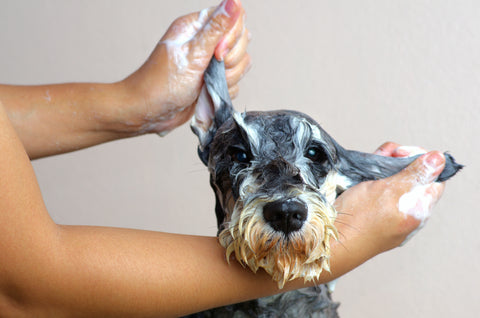
How to take care of your dog’s skin
Lots of dogs are prone to scratching, and often it’s nothing to worry about. But skin irritation can be due to fleas, parasites or allergies, and so it may need some attention. There are lots of simple things you can do at home to help keep your dog’s skin healthy and their coat bright and shiny.
How do I manage fleas?
As dog owners, we all know that fleas are one of those things that regularly bother our dogs. They love your doggy’s warm fur almost as much as you do! Once they’ve landed, they can live for up to 180 days! And whilst they’re there, they’ll lay their eggs in nice cosy places in your home. It’s not the most enjoyable thought...
Once those eggs hatch, the larvae can burrow into your dog’s bedding, or your own, carpets, and soft furnishings. Annoyingly for your dog, fleas bite and this can be really itchy or possibly a little bit more serious – particularly if your pooch is allergic or develops scabs or sores from too much scratching.
So, it’s really important to do as much as you can to prevent fleas from occurring. First, talk to your vet about regular flea treatments, or approved over-the-counter.
You can also help your dog by keeping their ‘special places’ clean and hygienic – for instance, the bedding, blankets and carpet where your doggy spends the most time. If you’ve already found fleas on your dog, we’d advise that you hot-wash your soft furnishings where you can and use recommended flea sprays to try and get rid of any eggs.

Can food allergies irritate skin?
Just like us, our dogs can suffer from food intolerances and allergies. It’s estimated that around 10% of doggy allergies are food related. That might not sound like much, but if your dog has a food allergy, he could be affected in various ways, one of which is itchy skin. This is because your pet’s immune system is fighting the allergic reaction, which in turn can cause itchy patches of skin as well as itchy eyes and ears.
This might be accompanied by poorly tummies or other signs that your dog is not feeling at their best. If you think your dog might have a food allergy, talk to your vet. You may need to discuss diet so that you can find out whether your dog does have an allergy and how to manage it. Your vet may suggest:
- Skin testing to eliminate the possibility of environmental allergies like pollen or dust
- An ear discharge test
- An elimination diet – this is very similar to the process used for humans. Your dog is taken off all regular food and put on one type of new food. Once your vet is happy that this food is OK, other foods are introduced one-at-a-time and very gradually, to assess results.
Does my dog have a skin infection?
If your dog is scratching a lot, they may open up a wound which could get infected. The best way to find out if your dog has a skin infection is to go to the vet when you notice a patch of skin that looks different from normal. For example:
- There is hair loss around the skin
- Skin is redder than usual, or looks different to the skin around it
- Skin is inflamed
- There is an open scratch or wound
- Your dog is constantly scratching or licking one specific area of skin.
Your vet will be able to take a look at the area you are worried about and suggest relevant treatment.
What about dry, flaky skin on dogs?
Dogs get dandruff just like we do, but unfortunately there’s no Head and Shoulders for dogs! There are various reasons for this dry skin, including:
- Parasites like fleas and mites
- Food allergies
- Environmental allergies
- A lice infection
- Bacterial or fungal infections
Dry skin often affects the shine and quality of your dog’s coat. There’s also the itchiness associated with flaking skin, which could make your pooch more irritable or quieter than usual. If you want to relieve that annoyance for your dog, you might want to look into supplements that include ingredients like Omega 3 and 6 which promote healthy skin and coat.

What about sensitive skin?
Some dogs have naturally sensitive skin – and it’s been found that this can be an issue for specific breeds too, including Golden Retrievers, Poodles, and Boxers. If you notice that your dog is a regular scratcher, you could consider looking for supplements that support skin health. YuDERM Itchy Dog uses our premium cold-pressed Omega 3 and 6 oils. These help to calm sensitive skin, reducing scratching and giving your doggy more comfortable days and nights.
How do I keep my dog’s skin healthy from day-to-day?
Adding a supplement to your dog’s diet can help them to maintain healthy skin, a shiny coat and stronger nails. Pay attention to the ingredients list when you’re choosing a supplement. Look for one with well-balanced, natural ingredients, such as Vitamins B, C and D, and minerals like zinc and Biotin, which are essential for keratin production. We include all these ingredients and more in YuDERM Boost, which is designed to keep your dog happy and hairy! To learn more about our all-natural ingredients and what they can do for your pooch, read our blog article on the topic here.
If you would like any more advice or information, call our friendly team on 01462 416866. You can also check out our other useful skin and coat blogs for more helpful hints and tips by following this link.
Do you have your own tips for caring for your dog’s skin? Join us on Facebook and Instagram and share your knowledge and pictures with our community of likeminded pet-lovers.








